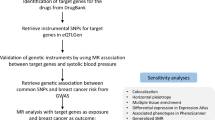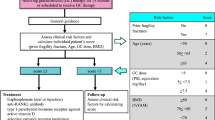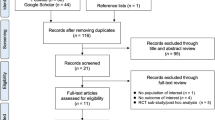Abstract
Objective
Aromatase inhibitors (AIs) are commonly used to treat hormone receptor positive (HR +) breast cancer. AI-induced musculoskeletal syndrome (AIMSS) is a common toxicity that causes AI treatment discontinuation. The objective of this genome-wide association study (GWAS) was to identify genetic variants associated with discontinuation of AI therapy due to AIMSS and attempt to replicate previously reported associations.
Methods
In the Exemestane and Letrozole Pharmacogenetics (ELPh) study, postmenopausal patients with HR + non-metastatic breast cancer were randomized to letrozole or exemestane. Genome-wide genotyping of germline DNA was conducted followed by imputation. Each imputed variant was tested for association with time-to-treatment discontinuation due to AIMSS using a Cox proportional hazards model assuming additive genetic effects and adjusting for age, baseline pain score, prior taxane treatment, and AI arm. Secondary analyses were conducted within each AI arm and analyses of candidate variants previously reported to be associated with AIMSS risk.
Results
Four hundred ELPh participants were included in the combined analysis. Two variants surpassed the genome-wide significance level in the primary analysis (p value < 5 × 10–8), an intronic variant (rs79048288) within CCDC148 (HR = 4.42, 95% CI: 2.67–7.33) and an intergenic variant (rs912571) upstream of PPP1R14C (HR = 0.30, 95% CI: 0.20–0.47). In the secondary analysis, rs74418677, which is known to be associated with expression of SUPT20H, was significantly associated with discontinuation of letrozole therapy due to AIMSS (HR = 5.91, 95% CI: 3.16–11.06). We were able to replicate associations for candidate variants previously reported to be associated with AIMSS in this cohort, but were not able to replicate associations for any other variants previously reported in other patient cohorts.
Conclusions
Our GWAS findings identify several candidate variants that may be associated with AIMSS risk from AI generally or letrozole specifically. Validation of these associations in independent cohorts is needed before translating these findings into clinical practice to improve treatment outcomes in patients with HR + breast cancer.


Similar content being viewed by others
Data availability
Data and material are available upon reasonable request to the corresponding author.
Code availability
Code is available upon reasonable request to the corresponding author.
References
Goss PE, Ingle JN, Martino S et al (2003) A randomized trial of letrozole in postmenopausal women after five years of tamoxifen therapy for early-stage breast cancer. N Engl J Med 349:1793–1802
Early Breast Cancer Trialists’ Collaborative G, Dowsett M, Forbes JF et al (2015) Aromatase inhibitors versus tamoxifen in early breast cancer: patient-level meta-analysis of the randomised trials. Lancet (London, England) 386:1341–1352
Hershman DL, Shao T, Kushi LH et al (2011) Early discontinuation and non-adherence to adjuvant hormonal therapy are associated with increased mortality in women with breast cancer. Breast Cancer Res Treat 126:529–537
Henry NL, Azzouz F, Desta Z et al (2012) Predictors of aromatase inhibitor discontinuation as a result of treatment-emergent symptoms in early-stage breast cancer. J Clin Oncol : Off J Am Soc Clin Oncol 30:936–942
Henry NL, Speth K, Lintermans A et al (2017) Associations between patient and anthropometric characteristics and aromatase inhibitor discontinuation. Clin Breast Cancer 17:350-355.e354. https://doi.org/10.1016/j.clbc.2017.1003.1002
Moscetti L, Agnese Fabbri M, Sperduti I et al (2015) Adjuvant aromatase inhibitor therapy in early breast cancer: what factors lead patients to discontinue treatment? Tumori 101(469–473):4. https://doi.org/10.5301/tj.5000376
Chim K, Xie SX, Stricker CT et al (2013) Joint pain severity predicts premature discontinuation of aromatase inhibitors in breast cancer survivors. BMC Cancer 13:401. https://doi.org/10.1186/1471-2407-1113-1401
Felson DT, Cummings SR (2005) Aromatase inhibitors and the syndrome of arthralgias with estrogen deprivation. Arthritis Rheum 52:2594–2598
Hadji P, Jackisch C, Bolten W et al (2014) COMPliance and arthralgia in clinical therapy: the COMPACT trial, assessing the incidence of arthralgia, and compliance within the first year of adjuvant anastrozole therapy. Ann Oncol 25(372–377):3. https://doi.org/10.1093/annonc/mdt1513
Mao JJ, Stricker C, Bruner D et al (2009) Patterns and risk factors associated with aromatase inhibitor-related arthralgia among breast cancer survivors. Cancer 115:3631–3639
Sestak I, Cuzick J, Sapunar F et al (2008) Risk factors for joint symptoms in patients enrolled in the ATAC trial: a retrospective, exploratory analysis. Lancet Oncol 9(866–872):8. https://doi.org/10.1016/S1470-2045(1008)70182-70187
Crew KD, Greenlee H, Capodice J et al (2007) Prevalence of joint symptoms in postmenopausal women taking aromatase inhibitors for early-stage breast cancer. J Clin Oncol 25(3877–3883):38. https://doi.org/10.1200/JCO.2007.3810.7573
Beckwée D, Leysen L, Meuwis K, Adriaenssens N (2017) Prevalence of aromatase inhibitor-induced arthralgia in breast cancer: a systematic review and meta-analysis. Support Care Cancer 25(1673–1686):16. https://doi.org/10.1007/s00520-00017-03613-z
Garcia-Giralt N, Rodriguez-Sanz M, Prieto-Alhambra D et al (2013) Genetic determinants of aromatase inhibitor-related arthralgia: the B-ABLE cohort study. Breast Cancer Res Treat 140:385–395
Fontein DB, Houtsma D, Nortier JW et al (2014) Germline variants in the CYP19A1 gene are related to specific adverse events in aromatase inhibitor users: a substudy of Dutch patients in the TEAM trial. Breast Cancer Res Treat 144:599–606
Leyland-Jones B, Gray KP, Abramovitz M et al (2015) CYP19A1 polymorphisms and clinical outcomes in postmenopausal women with hormone receptor-positive breast cancer in the BIG 1–98 trial. Breast Cancer Res Treat 151:373–384
Wang J, Lu K, Song Y et al (2013) Indications of clinical and genetic predictors for aromatase inhibitors related musculoskeletal adverse events in Chinese Han women with breast cancer. PLoS ONE 8:e68798
Borrie AE, Rose FA, Choi YH et al (2020) Genetic and clinical predictors of arthralgia during letrozole or anastrozole therapy in breast cancer patients. Breast Cancer Res Treat 6:020–05777
Hertz DL, Henry NL, Rae JM (2017) Germline genetic predictors of aromatase inhibitor concentrations, estrogen suppression and drug efficacy and toxicity in breast cancer patients. Pharmacogenomics 18:481–499
Ingle JN, Schaid DJ, Goss PE et al (2010) Genome-wide associations and functional genomic studies of musculoskeletal adverse events in women receiving aromatase inhibitors. J Clin Oncol : Off J Am Soc Clin Oncol 28:4674–4682
Umamaheswaran G, Kadambari D, Muthuvel SK et al (2021) Polymorphisms of T- cell leukemia 1A gene loci are not related to the development of adjuvant letrozole-induced adverse events in breast cancer. PLoS One 16:e0247989. https://doi.org/10.1371/journal.pone.0247989 (eCollection 0242021)
Dempsey JM, Xi J, Henry NL, Rae JM, Hertz DL (2018) Attempted replication of SNPs in RANKL and OPG with musculoskeletal adverse events during aromatase inhibitor treatment for breast cancer. Physiol Genomics 50:98–99
Henry NL, Skaar TC, Dantzer J et al (2013) Genetic associations with toxicity-related discontinuation of aromatase inhibitor therapy for breast cancer. Breast Cancer Res Treat 138:807–816
Hertz DL, Douglas JA, Kidwell KM et al (2021) Genome-wide association study of letrozole plasma concentrations identifies non-exonic variants that may affect CYP2A6 metabolic activity. Pharmacogenet Genomics 31:116–123. https://doi.org/10.1097/FPC.0000000000000429
Henry NL, Jacobson JA, Banerjee M et al (2010) A prospective study of aromatase inhibitor-associated musculoskeletal symptoms and abnormalities on serial high-resolution wrist ultrasonography. Cancer 116:4360–4367
Kadakia KC, Snyder CF, Kidwell KM et al (2016) Patient-Reported Outcomes and Early Discontinuation in Aromatase Inhibitor-Treated Postmenopausal Women With Early Stage Breast Cancer. Oncologist 21:539–546
Hertz DL, Douglas JA, Kidwell KM, et al. Genome-wide association study of letrozole plasma concentrations identifies non-exonic variants that may affect CYP2A6 metabolic activity. Pharmacogenetics and Genomics. 9000;Publish Ahead of Print.
Desta Z, Kreutz Y, Nguyen AT et al (2011) Plasma letrozole concentrations in postmenopausal women with breast cancer are associated with CYP2A6 genetic variants, body mass index, and age. Clin Pharmacol Ther 90:693–700
Das S, Forer L, Schönherr S et al (2016) Next-generation genotype imputation service and methods. Nat Genet 48(1284–1287):12. https://doi.org/10.1038/ng.3656
Gervasini G, Jara C, Olier C, Romero N, Martínez R, Carrillo JA (2017) Polymorphisms in ABCB1 and CYP19A1 genes affect anastrozole plasma concentrations and clinical outcomes in postmenopausal breast cancer patients. Br J Clin Pharmacol 83(562–571):5. https://doi.org/10.1111/bcp.13130
Niravath P, Chen B, Chapman JW et al (2018) Vitamin D Levels, Vitamin D Receptor Polymorphisms, and Inflammatory Cytokines in Aromatase Inhibitor-Induced Arthralgias: An Analysis of CCTG MA.27. Clin Breast Cancer 18:78–87. https://doi.org/10.1016/j.clbc.2017.1010.1009
Romero SAD, Su HI, Satagopan J et al (2020) Clinical and genetic risk factors for aromatase inhibitor-associated arthralgia in breast cancer survivors. Breast 49:48–54. https://doi.org/10.1016/j.breast.2019.1010.1008
Umamaheswaran G, Kadambari D, Muthuvel SK et al (2020) Association of CYP19A1 gene variations with adjuvant letrozole-induced adverse events in South Indian postmenopausal breast cancer cohort expressing hormone-receptor positivity. Breast Cancer Res Treat 182(147–158):1. https://doi.org/10.1007/s10549-10020-05656-10549
Machiela MJ, Chanock SJ (2015) LDlink: a web-based application for exploring population-specific haplotype structure and linking correlated alleles of possible functional variants. Bioinformatics 31(3555–3557):35. https://doi.org/10.1093/bioinformatics/btv3402
(2013) The Genotype-Tissue Expression (GTEx) project. Nat Genet 45:580–585. https://doi.org/10.1038/ng.2653.
Boyle AP, Hong EL, Hariharan M et al (2012) Annotation of functional variation in personal genomes using RegulomeDB. Genome Res 22(1790–1797):17. https://doi.org/10.1101/gr.137323.137112
Dong S, Boyle AP (2019) Predicting functional variants in enhancer and promoter elements using RegulomeDB. Hum Mutat 40(1292–1298):12. https://doi.org/10.1002/humu.23791
Gaunt TR, Shihab HA, Hemani G et al (2016) Systematic identification of genetic influences on methylation across the human life course. Genome Biol 17:61. https://doi.org/10.1186/s13059-13016-10926-z
Dufresne J, Bowden P, Thavarajah T et al (2018) The plasma peptides of ovarian cancer. Clin Proteomics 15:41. https://doi.org/10.1186/s12014-12018-19215-z
Thomas J, Leufflen L, Chesnais V et al (2020) Identification of Specific Tumor Markers in Vulvar Carcinoma Through Extensive Human Papillomavirus DNA Characterization Using Next Generation Sequencing Method. J Low Genit Tract Dis 24:53–60. https://doi.org/10.1097/LGT.0000000000000498
Liu QR, Zhang PW, Zhen Q, Walther D, Wang XB, Uhl GR (2002) KEPI, a PKC-dependent protein phosphatase inhibitor regulated by morphine. J Biol Chem 277:13312–13320
Drgonova J, Zimonjic DB, Hall FS, Uhl GR (2010) Effect of KEPI (Ppp1r14c) deletion on morphine analgesia and tolerance in mice of different genetic backgrounds: when a knockout is near a relevant quantitative trait locus. Neuroscience 165(882–895):8. https://doi.org/10.1016/j.neuroscience.2009.1010.1007
Lang I, Virk G, Zheng DC et al (2020) The Evolution of Duplicated Genes of the Cpi-17/Phi-1 (ppp1r14) Family of Protein Phosphatase 1 Inhibitors in Teleosts. Int J Mol Sci 21(5709):57. https://doi.org/10.3390/ijms21165709
Webber JL, Tooze SA (2010) Coordinated regulation of autophagy by p38alpha MAPK through mAtg9 and p38IP. EMBO J 29:27–40. https://doi.org/10.1038/emboj.2009.1321
Liu X, Xiao W, Wang XD, Li YF, Han J, Li Y (2013) The p38-interacting protein (p38IP) regulates G2/M progression by promoting α-tubulin acetylation via inhibiting ubiquitination-induced degradation of the acetyltransferase GCN5. J Biol Chem. 288:36648–36661. https://doi.org/10.31074/jbc.M36113.486910
Veyssiere M, Perea J, Michou L et al (2019) A novel nonsense variant in SUPT20H gene associated with Rheumatoid Arthritis identified by Whole Exome Sequencing of multiplex families. PLoS One 14:e0213387. https://doi.org/10.1371/journal.pone.0213387 (eCollection 0212019)
Chua KC, Kroetz DL (2017) Genetic advances uncover mechanisms of chemotherapy-induced peripheral neuropathy. Clin Pharmacol Ther 101:450–452
Stearns V, Jegede O, Chang VT-S et al (2021) Prospective validation of genetic predictors of aromatase inhibitor-associated musculoskeletal symptoms (AIMSS) in a racially diverse cohort: Results from ECOG-ACRIN E1Z11. J Clin Oncol 39:12003–12003
Wang J, Lu K, Song Y et al (2015) RANKL and OPG Polymorphisms Are Associated with Aromatase Inhibitor-Related Musculoskeletal Adverse Events in Chinese Han Breast Cancer Patients. PLoS ONE 10:e0133964
Hertz DL, Smith KL, Zong Y et al (2021) Further Evidence That OPG rs2073618 Is Associated With Increased Risk of Musculoskeletal Symptoms in Patients Receiving Aromatase Inhibitors for Early Breast Cancer. Front Genet 12:662734. https://doi.org/10.3389/fgene.2021.662734
Basch E, Deal AM, Dueck AC et al (2017) Overall Survival Results of a Trial Assessing Patient-Reported Outcomes for Symptom Monitoring During Routine Cancer Treatment. JAMA 318:197–198
Gupta A, Henry NL, Loprinzi CL (2020) Management of Aromatase Inhibitor-Induced Musculoskeletal Symptoms. JCO Oncol Pract 16(733–739):7. https://doi.org/10.1200/OP.1220.00113
Henry NL, Unger JM, Schott AF et al (2018) Randomized, Multicenter, Placebo-Controlled Clinical Trial of Duloxetine Versus Placebo for Aromatase Inhibitor-Associated Arthralgias in Early-Stage Breast Cancer: SWOG S1202. J Clin Oncol 36:326–332
Santa-Maria CA, Bardia A, Blackford AL et al (2018) A phase II study evaluating the efficacy of zoledronic acid in prevention of aromatase inhibitor-associated musculoskeletal symptoms: the ZAP trial. Breast Cancer Res Treat 171(121–129):1. https://doi.org/10.1007/s10549-10018-14811-10541
Burstein HJ, Prestrud AA, Seidenfeld J et al (2010) American Society of Clinical Oncology clinical practice guideline: update on adjuvant endocrine therapy for women with hormone receptor-positive breast cancer. J Clin Oncol : Off J Am Soc Clin Oncol 28:3784–3796
Siddiq A, Couch FJ, Chen GK et al (2012) A meta-analysis of genome-wide association studies of breast cancer identifies two novel susceptibility loci at 6q14 and 20q11. Hum Mol Genet 21:5373–5384
Ghoussaini M, French JD, Michailidou K et al (2016) Evidence that the 5p12 Variant rs10941679 Confers Susceptibility to Estrogen-Receptor-Positive Breast Cancer through FGF10 and MRPS30 Regulation. Am J Hum Genet 99:903–911
Michailidou K, Lindstrom S, Dennis J et al (2017) Association analysis identifies 65 new breast cancer risk loci. Nature 551:92–94
de Leeuw CA, Mooij JM, Heskes T, Posthuma D (2015) MAGMA: generalized gene-set analysis of GWAS data. PLoS Comput Biol 11:e1004219
Reinbolt RE, Sonis S, Timmers CD et al (2018) Genomic risk prediction of aromatase inhibitor-related arthralgia in patients with breast cancer using a novel machine-learning algorithm. Cancer Med 7(240–253):2. https://doi.org/10.1002/cam1004.1256
Funding
This research was supported by the Pharmacogenetics Research Network Grant No. U-01 GM61373 and Clinical Pharmacology Training Grant No. 5T32-GM08425 (both awarded to David A. Flockhart) from the National Institute of General Medical Sciences, National Institutes of Health (NIH); from Grants No. M01-RR000042 (University of Michigan), M01-RR00750 (Indiana University), and M01-RR00052 (Johns Hopkins University) from the National Center for Research Resources (NCRR), a component of the NIH; the Breast Cancer Research Foundation (BCRF) (N003173 to JMR); the National Cancer Institute (5T32CA083654, CA251343 to NLH); the National Institute of General Medical Sciences (GM099143 to J.M.R.); and the National Institutes of Health through the University of Michigan’s Cancer Center Support Grant (P30 CA046592) by the use of the following Cancer Center Core: University of Michigan DNA Sequencing Core. In addition, these studies were supported by grants from Pfizer (D.F.H.), Novartis Pharma AG (D.F.H.), and the Fashion Footwear Association of New York/QVC Presents Shoes on Sale (D.F.H.). Drugs were supplied by Novartis and Pfizer. The Genotype-Tissue Expression (GTEx) Project was supported by the Common Fund of the Office of the Director of the National Institutes of Health, and by NCI, NHGRI, NHLBI, NIDA, NIMH, and NINDS. The data used for the analyses described in this manuscript were obtained from the GTEx Portal on 08/31/2021.
Author information
Authors and Affiliations
Contributions
DLH was involved in designing this analysis and writing the manuscript. JAD and RMM conducted the statistical analysis. KMK cleaned the data for analysis and helped design the analysis. CLG helped generate the genetic data. ZD and TS helped design the initial trial and generate data. AMS, VS, DFH, and NLH designed the initial clinical trial and enrolled participants. JMR helped design this analysis and oversaw the genetic data generation and analysis.
Corresponding author
Ethics declarations
Ethics approval
This was a retrospective secondary analysis of a previously reported prospective clinical study. The prospective study was performed in line with the principles of the Declaration of Helsinki. Approval was granted by the Ethics Committee of each of the three participating Universities.
Consent to participate
Informed consent was obtained from all individual participants included in the study.
Consent to publish
The authors affirm that human research participants provided informed consent to participate. No individual data was included in this manuscript.
Conflict of interest
This work was supported in part by Pfizer and Novartis Pharma AG. Dr. Stearns has received research funding from Abbvie, Biocept, Celgene, Merck, Novartis, Medimmune, Pfizer, and Puma Biotechnology. Dr. Stearns is on an advisory board for Novartis (10/25/2021, is a member of the Data Safety Monitoring Board for Immunomedics, Inc, and Chair of the Data Safety Monitoring Board for AstraZeneca, and has received non-financial support from Foundation Medicine Study Assays. Dr. Henry has received research funding to conduct pharmaceutical sponsored clinical trials from Abbvie, Innocrin Pharmaceuticals, Pfizer, and Blue Note Therapeutics. Dr. Hayes reports research funding from Merrimack Pharmaceuticals, Eli Lilly, Menarini Silicon Biosystems, Puma Biotechnology, Pfizer, and Astra Zeneca in the last 24 months. He also reports consulting fees from Cepheid, Freenome, Artiman Ventures, Agendia, Lexent Bio, Epic Sciences, and Salutogenic Innovations. He is the named investigator of a patent held by the University of Michigan which is licensed to Menarini Silicon Biosystems, from whom he receives annual royalties. He holds stock options in Oncimmune LLC and InBiomotion.
Additional information
Publisher's note
Springer Nature remains neutral with regard to jurisdictional claims in published maps and institutional affiliations.
Supplementary Information
Below is the link to the electronic supplementary material.
Rights and permissions
About this article
Cite this article
Hertz, D.L., Douglas, J.A., Miller, R.M. et al. Genome-wide association study of aromatase inhibitor discontinuation due to musculoskeletal symptoms. Support Care Cancer 30, 8059–8067 (2022). https://doi.org/10.1007/s00520-022-07243-8
Received:
Accepted:
Published:
Issue Date:
DOI: https://doi.org/10.1007/s00520-022-07243-8




